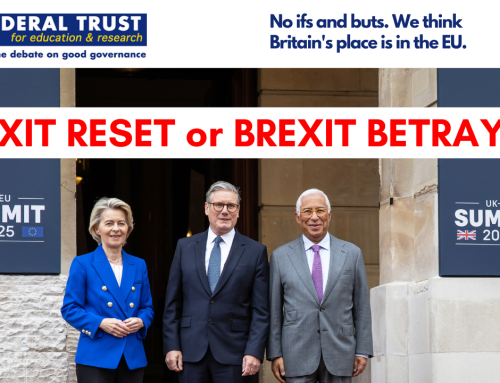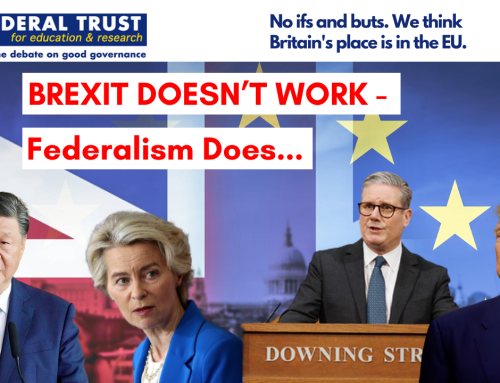
by Professor Sam Whimster
Associate Director and Head of UK Futures Programme, Global Policy Institute
22nd July 2019
This is a commentary in response to the blog by our Senior Research Fellow Dr Andrew Blick: Brexit – By Royal Appointment?, published on 12th July 2019
Andrew Blick in “Brexit – By Royal Appointment?” provides a lucid insight into the mysteries of the British constitution as it relates to the monarch and the appointment of the Prime Minister. He notes a (probable) Johnson premiership from the outset could become untenable and this could place the Queen “in an uncomfortable position”. This could be stated more strongly: the Queen could be faced with the most difficult decision of her reign. While the newspapers just assume a seamless succession, the Queen must know that the outgoing prime minister, Theresa May, will be less than sincere in advising her that her successor can form a stable (?) government.
A major problem for public debate, indeed public knowledge, is the lack of clarity on the constitutional rules governing the role of the monarch. A certain romantic mystery has deliberately shrouded the second “Elizabethan Age”, but under the unremitting glare of Brexit politics this may prove to be inadequate.
The monarch is the Head of State and this is obviously true in a ceremonial and symbolic sense. But is the monarch a head of state in a political sense, in the way that many advanced republics and constitutional monarchies have a head of state? Heads of state are given discretionary powers, under a constitution, to give assent or refuse a government coalition and aspects of its formation, including personnel. Heads of state sometimes make comments about the tenor or direction of governments – as happens in the Federal German Republic, for example. At certain points then, every so often a head of state is forced to intervene politically. The “understanding” of the UK’s monarch is that she is above politics. But what happens when the tide of politics reaches the threshold of “the Palace”? The monarch is in a double bind: not acting politically could bring disrepute to the Palace (and the realm), yet at the same time the monarch is above politics.
At the institutional level of Parliament, the civil service, and the opaque nature of Councils of State and the monarch’s office, everything is done to shield the monarch from any involvement in politics. Yet Dr Blick outlines a number of very plausible scenarios where the monarch would have convincing reasons not to give Royal Assent to a Johnson government. Some have said that we have already been in this situation. In June 2017 Prime Minister May presented the Palace with the assurance that the Conservative Party’s coalition with the DUP was a done deal. A confidence-and-supply agreement was announced on 9 June and the Queen invited Mrs May to form a government on 11 June. But considerable haggling took place after the royal assent was given and before Northern Ireland’s future budget and the final agreement was reached.
This in turn raises question about the role of the civil service. In February 2010 the Cabinet Secretary published a cabinet manual intended to remove ambiguity and uncertainty in the functioning of the executive, especially the handover of governments. In particular it would remove the Palace from any involvement in who to invite to form a new government in the event of the predicted hung Parliament. In depoliticising the Palace the rulebook placed the onus on political parties to reach coalition agreements, quickly. Some thought at the time that the Coalition government should have been given more time – it had 5 days – to discuss their political arrangements, and this may have compromised the Liberal Democrats’ demands. This last point is of course open to debate, as were the options facing the outgoing prime minister. However, the Cabinet rulebook did ensure that the Palace was kept above the fray. Did the Cabinet rulebook get deployed to the same extent in July 2017 – to the extent that the Palace was seen to have behaved impeccably? There is a suspicion that Mrs May duped the Palace. The political role of a head of state remains, indeed it might be a desideratum if there was a Palace rulebook.
I will switch the argument at this juncture to legitimacy. There are quite a few in play. By legitimacy I mean the the belief held by voting citizens in the legitimacy of those who exercise power and authority. The legitimacy of government is based on party political competition, universal franchise, general elections of MPs representing their constituents, and parliamentary approval of the executive. This has been the arrangement up to now.
In addition, Parliamentary leaders are these days commoners. In claiming to possess a parliamentary majority, a would-be prime minister can also draw on his or her electoral legitimacy – and not take too kindly to any objections raised by the Palace. Blair and Thatcher are recorded as being somewhat impatient with the niceties of the role of the monarch as head of state. Likewise Mrs May herself probably felt fully justified in June 2017 in giving an assurance to the Palace that she was able to put together a majority in the House of Commons.
We also have the peculiarity that Johnson, or Hunt, will become party leader on the choice of a miniscule electorate of Conservative party members that is way out of line with the overall electorate. Political parties are free associations and their specific rules are perfectly legal. But the next Conservative party leader, if he becomes the next prime minister, will be given a far harder time than Macmillan, Callaghan, or Gordon Brown. He will face the charge of illegitimacy.
What is the legitimacy of the monarchy? In the long run it is a form of charisma that has become routinised through succession. Monarchy inherits the original charisma of kingship. And as Hobsbawn argued the traditions and trappings of monarchy – the magic bit – are also invented and reinvented. Overall, though, it is a charismatic inheritance handed down and revitalised through coronation – and considerable effort went into Elizabeth II’s coronation. Younger royals seem to be exchanging charisma for celebrity culture, a recognition that inherited charisma has a fading legitimacy in a time of popular culture and social media.
A third type of legitimacy is the “will of the people” and populism. The will of the people must be obeyed by parliament and here legitimacy of representative democracy is directly challenged. A constitutional monarchy is part of the institutional architecture of parliamentary democracy. Faced with a populist prime minister – if Johnson adopted a populist strategy as PM, or Farage became PM – the monarch would be moulded into an Anglosphere figurehead with no constitutional importance.
The present monarch almost certainly can ride out quite a lot of upcoming and unavoidable turbulence. The next Prime Minister may be only a two week wonder, and the Leader of the Opposition may be called to form a government. This is part of the argy-bargy of parliamentary politics. But there will be more damaging consequences if Johnson, or whoever, calls a General Election and then claims an alliance with some other party which has yet to be transacted; or, if an assurance is given to the Palace that Parliament will not be shut down while a new Brexit deal is concluded. A Boris Johnson assurance may not command the full confidence of the Palace.
The Queen’s legitimacy as a Head of State rests on being above politics, but this makes her vulnerable to challenger legitimacies and adventurers. Having a Palace rulebook on prime-ministerial succession should be considered with some urgency rather than trusting to the Palace’s fallible judgement and discretion. Charisma itself is infallible but is also conditional on success – as even Chinese emperors found out when geomancy failed to deliver.





